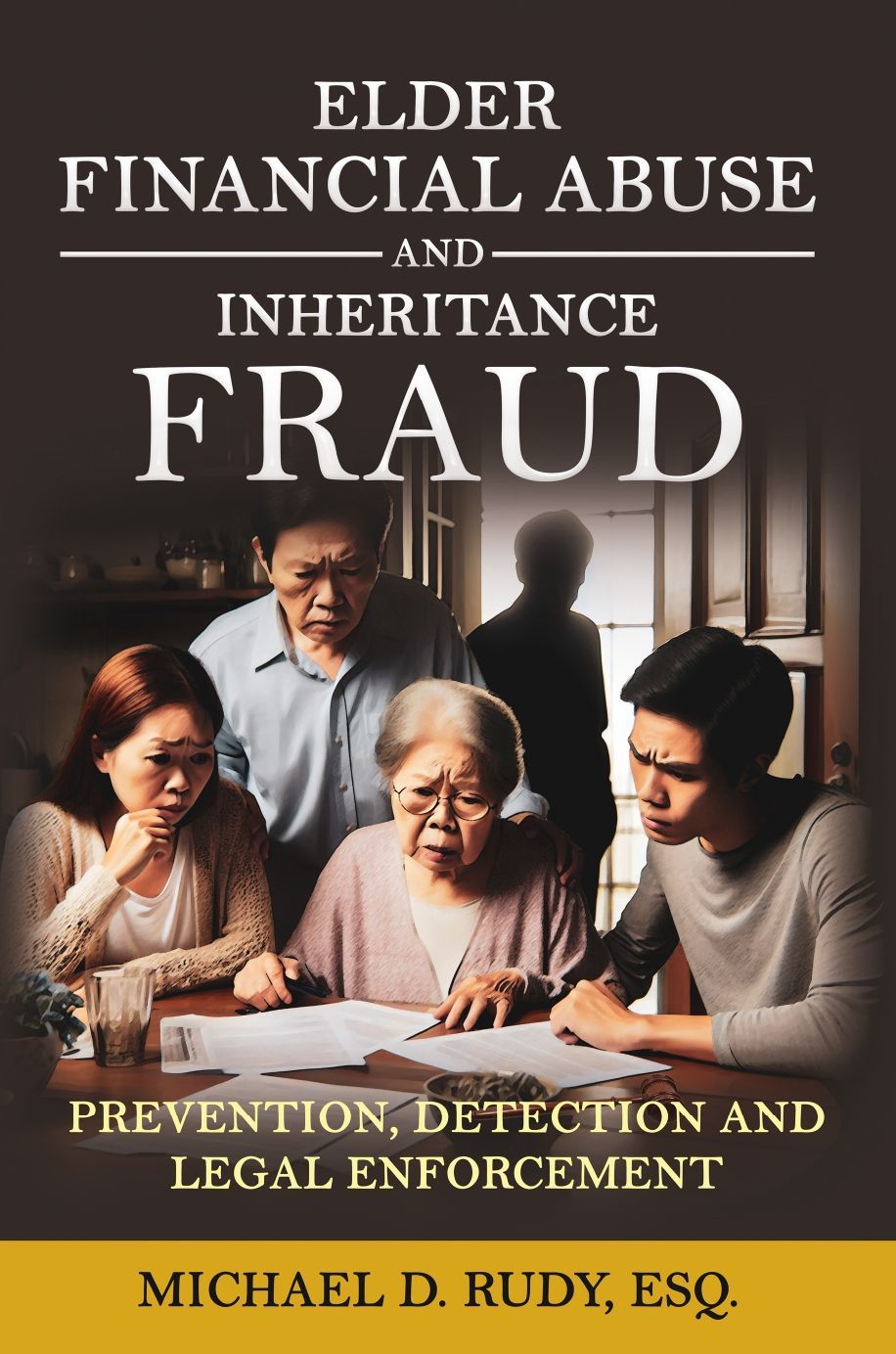Book
by
Michael D. Rudy
Get My Latest Book
Elder Financial Abuse and Inheritance Fraud
Prevention, Detection and Legal Enforcement

BOOK CONTENT
This comprehensive 16-Chapter, 438-page book is the first of its kind as it covers in a both a scholarly and straight forward manner the topic of elder financial abuse and inheritance fraud. This book is carefully researched and documented, citing hundreds of published academic and authoritative sources covering the discussion of the prevention, identification, and forms of elder financial abuse and the recovery of embezzled assets. Despite its scholarly format, it is easily digestible for the typical untrained reader desiring to learn about this invaluable and infrequently discussed outside the family topic.
This book is authored by Attorney Michael D. Rudy who has over 38 years' legal experience in the investigation, litigation, and recovery of embezzled or stolen real estate, retirement assets, bank accounts insurance policy death benefits as well as many other forms of assets stolen from elderly individuals and their heirs.
This book is written and designed to be read by a wide audience. This audience includes potential or actual victims of elder financial abuse, their family, other support members, state elder policy directors, law enforcement personnel, legislative members and aides, physicians, elder law attorneys, the judiciary and all other individuals and groups who assist and care for elderly individuals.
Although this book is written with many examples and statistics pertaining to the State of Hawaii, data of other states is also discussed and provided throughout the book. The book also contains a wealth of purely national data describing the scope and magnitude of fraud perpetrated on the elderly.
The information gives an illuminating revelation of actual past financial abuse and trust and estate cases that the author has personally litigated. It also contains a discussion of the various scams and techniques that perpetrators employ as well as a description of various types of kinds assets that they commonly target.
The book also discusses the typical warning signs of financial abuse and potential inheritance fraud which individuals can use to help prevent elder abuse before it even starts. The book also takes the reader through the elements of the important decision-making process involved in hiring a lawyer for the purposes of engaging in stolen asset recovery using the judicial system.
There is extensive and valuable advice provided to primary care physicians, psychologists, geriatricians, and other healthcare providers who are often called upon by family members to render medical-legal opinions concerning legal capacity of their elderly patient that may either knowingly or unknowingly used in a court of law.
No matter who the reader is or where they or the victim may be located, this book contains valuable insights and recommendations as to the prevention of elder financial abuse and inheritance fraud. The recommendations in this book are designed to assist in the recovery of misappropriated assets in the event a victim and their family is presented with the tragic situation of embezzlement, theft, or inheritance fraud. The goal is to save years of pain and anguish in picking up the pieces of held by torn families caused by lost savings and inheritances belonging to the victims of financial fraud.
The payback on the investment of time and energy in developing the simple protective tools provided in this book may be immeasurable to your family, friends and loved ones!
This book discusses:
Financial Elder Abuse
What is financial elder abuse and what are over 15 common examples?
Inheritance Fraud
What is inheritance fraud and what are its root causes?
Individual Incidents and Volume
How wide and large is the problem of elder financial abuse and inheritance fraud, both in the number of individual incidents and total volume lost?
Typical Perpetrator
Who was the typical perpetrator of elder financial abuse or inheritance fraud?
Typical Victim
What is the profile of the typical victim of elder financial abuse, and who is most at risk?
Specific tests
What specific tests should one take to stop elder financial abuse before it even starts?
What to do?
Once financial elder abuse or inheritance fraud is discovered, what should one do?
Civil Litigation
How does one specifically decide whether to initiate civil litigation in the courts to attempt to recover embezzled or stolen assets?
Undue Influence
What is undue influence? And how does it relate to diminished capacity in elder financial abuse?
Legal ability of family member
How do I know if a close family member had the legal ability to sign over a suspicious deed of real property or to sign a last-minute will or trust in which family members have been excluded?
Contested Conservatorship
What is a contested conservatorship and how do these cases relate to a future will or trust contest?
Policy Recommendations
What specific policy recommendations should be made to families, victims, legislative members, and judicial members, to curb the incidences of elder financial abuse and inheritance fraud?
Prevention
How can an attorney or physician specifically help reduce financial elder abuse in their own professional practices?

